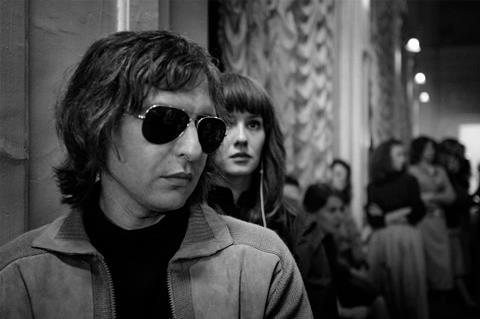The early 80s Leningrad music scene is the subject of this drama by Kirill Serebrennikov, currently under house arrest in Russia

Dir. Kirill Serebrennikov. Russia/France. 2018. 126 mins.
The ideal of rock ‘n’ roll rebellion has long been the stalest cliché in the book, but Russian drama Leto reminds us of a time and place where it really meant something – the Brezhnev era in the USSR. This vivid, unashamedly romantic evocation of those years comes from Russian director Kirill Serebrennikov, in an expansive turn away from the largely interior-bound drama of his 2016 study of fanaticism, The Student. His new film may seem to hark back nostalgically to a time when dissent carried real social weight, yet circumstances have proved it still does: an outspoken critic of the Kremlin, Serebrennikov is currently under house arrest on a contested corruption charge. Interest in his plight, and the political content of Summer, will give the film a definite boost on the international circuit even if, taken as a rock biopic, the film’s content isn’t always satisfying.
The effect is pitched awkwardly between The Great Rock ‘n’ Roll Swindle and Cliff Richard’s Summer Holiday.
An evocation of the early 80s Leningrad music scene, and centred dramatically around a love triangle, Summer focuses on two influential musicians and the woman between them – Natalia Naumenko, on whose memoirs the film is based. At the start, the kingpin of the Leningrad rock scene is Mike Naumenko (Roma Zver, himself a rock singer), seen with his band Zoopark pumping out angry, scrappy garage rock with tangible Lou Reed/ Pistols influences. For all his moody, shades-wearing mystique, Mike, a caretaker by day, is a family man, happily married to Natasha (Irina Starshenbaum), mother of their baby son Genia. While Mike holds court on the beach one day, two young aspiring singers turn up – one of them shy but glamorous songwriter Viktor Tsoï (German-born, Korea-based Teo Yoo), who would himself become a legendary figure as figurehead of the band Kino.
Much of the film vividly evokes the Leningrad scene at the time, shot by Vladislav Opelyants in stark and vivid black and white that inevitably recalls the Joy Division biopic Control. This aspect of the film reveals the way that the underground had to negotiate with the system – with bands needing their material approved in order to play at official rock clubs (quiet sitting down only). Long steadicam takes abound, as the camera tracks around the glumly functional concert venues and the over-populated flats where musicians and friends meet to appreciate Western music (Blondie, Bowie, T.Rex, even that icon of revolt Billy Joel) and to earnestly debate the meaning of their own work.
On a more intimate level, there’s the slow-burning, seemingly chaste romance between Natasha and Viktor. In fact, while she speaks less than the voluble men around her, Natasha establishes herself, through Starshenbaum’s reserved but moving performance, as the emotional centre of the film.
Where the film may rankle with, rather than engage, rock fans is in its awkward aspirations to break its realist bounds. There are brief Super-8 style inserts in colour, and several fantasy sequences – the images customised by Dmitri Bulgakov’s retro scratch animations – in which the cast breaks out into covers of familiar hits. Apart from an imaginatively reworked version of ‘All the Young Dudes’, these songs are mostly in a gauche jukebox-musical register: a busload of commuters burst into Iggy Pop’s ‘The Passenger’ in strong Russian accents, and a confrontation on a train explodes into ‘Psycho Killer’. The effect is pitched awkwardly between The Great Rock ‘n’ Roll Swindle and Cliff Richard’s Summer Holiday.
Ultimately too repetitive and self-indulgent to justify its long running time, Leto makes some claim on our emotions at the very end, as discreet captions show that we’ve been watching a doomed generation: Tsoï died in 1990, Naumenko the following year. The film’s energy and passion (and no doubt, eye for detail) can’t be faulted, but a tighter film could have more pointedly made the connection between the subjects’ brief lifespans and the fate of a young culture of refusal that arguably died when the system it questioned was replaced by a differently oppressive social order.
Production companies: Hype Film, Kinovista
International sales: Charades, carole@charades.eu
Producers: Ilya Stewart, Murad Osmann, Pavel Buria, Mikhail Finogenov
Screenplay: Mikhail Idov, Lily Idova, Kirill Serebrennikov
Cinematography: Vladislav Opelyants
Production design: Andrei Ponkratov
Editor: Yuri Karih
Main cast: Roma Zver, Irina Starshenbaum, Teo Yoo, Philipp Avdeev, Evgeny Serzin






![The Brightest SunScreen[Courtesy HKIFF]](https://d1nslcd7m2225b.cloudfront.net/Pictures/274x183/3/5/0/1448350_thebrightestsunscreencourtesyhkiff_312678.jpg)















![The Brightest SunScreen[Courtesy HKIFF]](https://d1nslcd7m2225b.cloudfront.net/Pictures/100x67/3/5/0/1448350_thebrightestsunscreencourtesyhkiff_312678.jpg)

